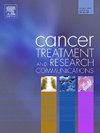FBXW7抑癌基因表达和突变在结直肠癌患者中的预后价值:一项meta分析
IF 2.4
Q3 Medicine
引用次数: 0
摘要
结直肠癌(CRC)是全球癌症相关死亡的第二大常见原因。肿瘤抑制基因FBXW7被认为在决定患者预后方面起着关键作用。本研究旨在评估FBXW7基因突变对结直肠癌患者预后的影响。方法对PubMed、Scopus、Web of Science、谷歌Scholar等数据库进行全面检索。利用风险比(hr)和95%置信区间(ci)来评估FBXW7表达减少或突变对结直肠癌患者无病生存期(DFS)或总生存期(OS)的影响。结果本荟萃分析包括15项研究,发现FBXW7低表达或突变与较差的OS (HR=1.60, 95% CI= 1.25至2.04,I²= 65%)和DFS (HR=2.14, 95% CI= 1.33至3.43,I²= 61%)密切相关。敏感性分析没有发现任何研究是异质性的重要来源,也没有观察到发表偏倚的证据。与随访时间较短的研究不同,随访≥36个月的研究显示有显著的OS相关性(HR=1.62, 95% CI= 1.20 ~ 2.17)。基于突变的研究(HR=1.38, 95% CI= 1.08 ~ 1.77)和基于表达的研究(HR=2.45, 95% CI= 1.70 ~ 3.54)均显示较差的OS,而DFS相关性仅在基于表达的研究中显著(HR=2.41, 95% CI= 1.43 ~ 4.07)。与OS的相关性最强的研究来自中国(HR=1.99, 95% CI= 1.27 ~ 3.12)和美国(HR=1.63, 95% CI= 1.17 ~ 2.26),而与DFS的相关性主要见于非中国研究(HR=3.03, 95% CI= 1.22 ~ 7.53)。结论本研究提示FBXW7表达减少或突变与CRC患者更差的OS和DFS有关。本文章由计算机程序翻译,如有差异,请以英文原文为准。
Prognostic value of FBXW7 tumor suppressor gene expression and mutations in patients with colorectal cancer: A meta-analysis
Background
Colorectal cancer (CRC) ranks as the second most common cause of cancer-related mortality globally. The tumor suppressor gene FBXW7 is considered to play a key role in determining patient prognosis. This study aims to assess the impact of FBXW7 gene mutations on the prognosis of CRC patients.
Methods
A thorough search of different databases, including PubMed, Scopus, Web of Science, and Google Scholar, was performed. Hazard ratios (HRs) along with 95 % confidence intervals (CIs) were utilized to assess the effect of reduced expression or mutation of FBXW7 on disease-free survival (DFS) of CRC patients or their overall survival (OS).
Results
This meta-analysis, which included 15 studies, found that low FBXW7 expression or mutations were strongly linked to poorer OS (HR=1.60, 95 % CI= 1.25 to 2.04, I²=65 %) and DFS (HR=2.14, 95 % CI= 1.33 to 3.43, I²=61 %). Sensitivity analyses did not identify any study as a significant source of heterogeneity, and no evidence of publication bias was observed. Studies with ≥36 months of follow-up demonstrated significant OS association (HR=1.62, 95 % CI= 1.20 to 2.17), unlike those with shorter follow-up periods. Both mutation-based studies (HR=1.38, 95 % CI= 1.08 to 1.77) and expression-based studies (HR=2.45, 95 % CI= 1.70 to 3.54) indicated poorer OS, while DFS correlation was significant only in expression-based studies (HR=2.41, 95 % CI= 1.43 to 4.07). The strongest relationship with OS was observed in studies from China (HR=1.99, 95 % CI= 1.27 to 3.12) and the USA (HR=1.63, 95 % CI= 1.17 to 2.26), while the correlation with DFS was mainly seen in non-Chinese studies (HR=3.03, 95 % CI= 1.22 to 7.53).
Conclusion
This study suggests that FBXW7 reduced expression or mutations are linked to worse OS and DFS in CRC patients.
求助全文
通过发布文献求助,成功后即可免费获取论文全文。
去求助
来源期刊

Cancer treatment and research communications
Medicine-Oncology
CiteScore
4.30
自引率
0.00%
发文量
148
审稿时长
56 days
期刊介绍:
Cancer Treatment and Research Communications is an international peer-reviewed publication dedicated to providing comprehensive basic, translational, and clinical oncology research. The journal is devoted to articles on detection, diagnosis, prevention, policy, and treatment of cancer and provides a global forum for the nurturing and development of future generations of oncology scientists. Cancer Treatment and Research Communications publishes comprehensive reviews and original studies describing various aspects of basic through clinical research of all tumor types. The journal also accepts clinical studies in oncology, with an emphasis on prospective early phase clinical trials. Specific areas of interest include basic, translational, and clinical research and mechanistic approaches; cancer biology; molecular carcinogenesis; genetics and genomics; stem cell and developmental biology; immunology; molecular and cellular oncology; systems biology; drug sensitivity and resistance; gene and antisense therapy; pathology, markers, and prognostic indicators; chemoprevention strategies; multimodality therapy; cancer policy; and integration of various approaches. Our mission is to be the premier source of relevant information through promoting excellence in research and facilitating the timely translation of that science to health care and clinical practice.
 求助内容:
求助内容: 应助结果提醒方式:
应助结果提醒方式:


